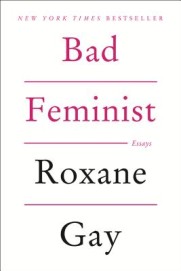 Roxane Gay
Roxane Gay
Harper Perennial ($15.99)
by Sally Franson
In Bad Feminist, Roxane Gay’s first essay collection and second book released in 2014, the author asserts that the impossibility of perfection should not negate earnest effort when it comes to navigating identity politics. But the “bad” in her feminism serves as absolution for whatever contradictions the reader may encounter in the text. “I regularly fuck it up,” Gay writes in the introduction. “Consider me already knocked off [the pedestal].” She’s only one person, she doesn’t represent every woman, and she’s flawed as all get-out. Okay?
This kind of postmodern, shrugging, “just my opinion” rhetorical move occurs frequently in Gay’s personal essays, but also in her more politicized work. In a piece titled “The Illusion of Safety/The Safety of Illusion,” she addresses the debate among feminists surrounding trigger warnings (markers that preface potentially threatening content for those suffering from PTSD) and ultimately argues against their efficacy. Rather than parsing this inefficacy as a rhetorician—a discipline in which Gay holds a Ph.D.—she relies on a performance of common sense. “Life, apparently, requires a trigger warning,” she concludes, and you can almost hear her sigh. “Trigger warnings cannot save me from myself.” She follows up on these vague rhetorical bombs with white space, as if what these bon mots needed was a little room for applause.
This essay, and most of the others, were originally published online, and regardless of Gay’s actual process, much of the writing in this collection possesses the urgent, stream-of-consciousness stylings of something banged out in response to a Twitter invitation to guest blog. For example, in a review of Diana Spechler’s Skinny originally published on Bookslut, Gay admits to Googling Spechler to see if she was overweight like her novel’s protagonist, only to discover she is “thin” and “gorgeous.” This is a problem for reasons Gay cannot articulate: “Her appearance does not matter, but it does,” she writes. She asserts that the book would be better if the protagonist were a hundred pounds overweight rather than thirty, but claims that Spechler was too afraid “to go there.” Where, exactly, Gay doesn’t say, but the ambiguity represents a troubling pattern in this collection. What appears revelatory scrolling down a home page can appear only half-finished in print.
Fortunately, Gay’s lack of precision matters less in the personal essays, and her wry-but-vulnerable persona invites quietude in the reader, and touchstones of shared humanity. Whether describing Scrabble tournaments or devastating incidents of sexual violence, Gay is at her best when creating worlds for readers to enter, in the hopes that they may be transformed. “Books are often far more than just books,” she writes, and while this book has its shortcomings, it also possesses moments of astonishing truth. For that reason, for “bad” feminists everywhere, it might be very good indeed.

